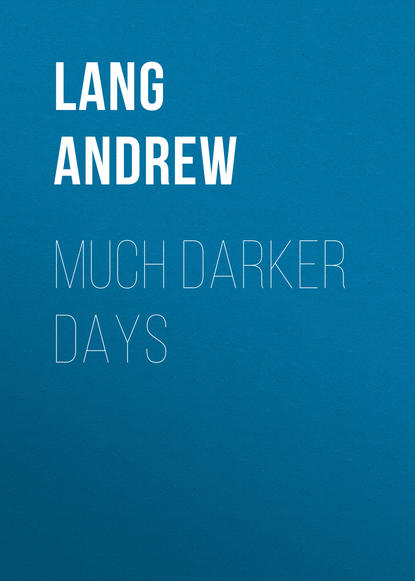По всем вопросам обращайтесь на: info@litportal.ru
(©) 2003-2024.
✖
Much Darker Days
Настройки чтения
Размер шрифта
Высота строк
Поля
‘Oh, to see the fun,’ he replied. ‘Fellow being tried for killing me. The morbid interest excited round here is very great. Doubt your getting front seats.’
‘Can’t you manage it for me?’ I asked imploringly.
‘Daresay I can. Here, take my card, and just mention my name, and they’ll let you in. Case for the prosecution, by the way, most feeble.’
Here the appearance, handing me a card, nodded, and vanished in the crowd.
I returned to Philippa, where I had left her in the four-wheeler. We drove off, and found ourselves before a double-swinging (ay, ominous as it seemed, swinging) plain oak door, over which in old English letters was written —
CRIMINAL COURT.
I need not describe the aspect of the court. Probably most of my readers have at some time in their lives found themselves in such a place.
True to the minute, the red-robed Judge appears. It is Sir Joshua Juggins, well known for his severity as ‘Gibbeting Juggins.’
Ah, there is little hope for William Evans.
I have learned from a neighbour in court the evidence against Evans is purely circumstantial. He has been found in possession of a peculiar key, believed to have belonged to Sir Runan.
Well may they call the case for the prosecution weak.
William must have found that fatal key which Philippa took from the slain man.
On that accident the whole presumption of his guilt is founded.
The Grand Jury (country gentlemen – idiots all!) find a ‘True Bill.’
The clerk reads the indictment that ‘he, William Evans, did feloniously, wilfully, and of malice aforethought, kill and murder Sir Runan Errand, Baronet.’
As the reading goes on Philippa is strangely moved.
‘Basil,’ she whispered, ‘don’t you see the splendid, unequalled chance for an advertisement! I’ll get up and make a speech, and say I did it. Of course they can’t prove it, but it will set every one talking, and bring hundreds of pounds into the house every night.’
I now observed that Philippa had half slipped off her mantle and bonnet. Beneath these coverings she was dressed in wig and gown, like Mrs. Weldon in the photographs.
‘For goodness’ sake, Philippa, don’t!’ I whispered.
The clerk turned to William Evans, the prisoner at the Bar.
‘Are you guilty, or not guilty?’
In the silence a cigarette-ash might have been heard to drop, if any one had been smoking.
The long silence was broken, but not by the prisoner.
By Philippa!
Rising to all her stately height, with her flowing robes around her, she stood at bay. Then her clear deep voice rang out: —
‘My lord, I was the party that did it!’
‘Order in the court! order in the court!’ cried the ushers.
‘I commit you! I commit you!’ thundered Lord Justice Juggins. ‘Take her away. Five years and hard labour.’
Struggling violently, Philippa was dragged away by the minions of the law.
I notice one visitor turn round, and gaze at the commotion.
It is Mrs. Thompson, the Bearded Woman.
Silence has scarcely been restored, when it is again broken.
A manly form rises. A deep voice exclaims: —
‘My lord, the prisoner is innocent. I am the person whom he is said to have murdered.’
The form, the voice – it is Sir Runan Errand!
Again I hear the sharp accents of Mr. Justice Juggins.
‘Is this court a bear-garden or the House of Commons? Take that man out. Give him five years and two dozen lashes.’
Scarcely had the court resumed its wonted aspect of business, scarcely had the prisoner again been asked to plead, when a shrill voice shattered the stillness.
‘My lord, the key found in the prisoner’s possession is my cellar-key.’
This time the bold interrupter was Mrs. Thompson, the Bearded Woman.
‘Five years as usual, and hard labour,’ said Sir Joshua Juggins, wearily. He was tiring of his task. ‘Please, my lord, it warn’t none of me,’ came a hoarse whisper from the prisoner at the bar.
‘Who asked you to speak? Is that the way to plead?’ snapped the judge. ‘Give him five years also, for contempt of court.’
William Evans was carried out in hysterics.
The plot, the mystery had thickened.
I now felt that there was only one way of fathoming the secret of the crime. I also must get myself committed! Then I would be able to rejoin the other actors in this strange drama, and learn their motives, and the real facts of the case.
In a moment my resolution was taken.
Springing to my feet, I exclaimed in clarion tones: —
‘My lord, I am an accessory after the fact.’
Sir Joshua Juggins gave a cry of despair. Then mastering himself, he whispered: —
‘Take that idiot away, and give him penal servitude for life.’











